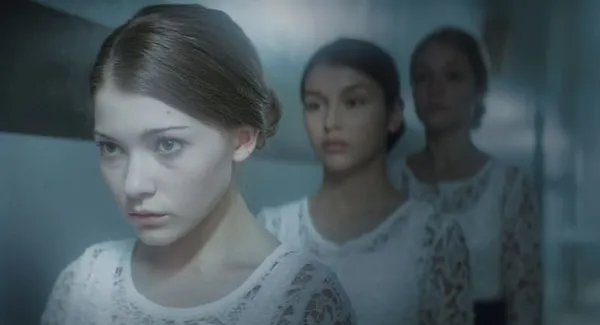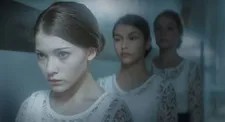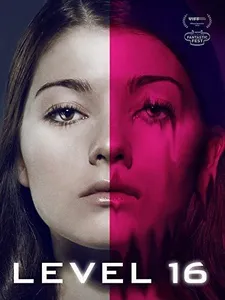 |
| Ready for instruction in Level 16 Photo: Glasgow Film Festival |
Vivien (Katie Douglas) and Sophia (Celina Martin) have been in the Academy for as long as they can remember. Each day has a familiar routine: they rise, take their pills, watch a video reminding them of the virtues and go to their lessons. Vivien has never seriously questioned this, but when Sophia stops taking her medication and confronts her with a frantic, whispered warning, she begins to see things differently. Danishka Esterhazy’s sinister science fiction film has attracted comparisons with The Handmaid’s Tale and is one of the most intriguing offerings at this year’s Glasgow Film Festival.
The director is currently hard at work in South Africa, shooting her next film, but took time out to talk about Level 16 – a film all the more dear to her because she had to battle to get it made.
“I’d just graduated from film school in Canada – in Toronto – and I wanted to write my first feature film. I’d been a long term fan of science fiction but I guess I felt that genre hadn’t done a very good job of telling stories about women or presenting women, so I guess I wanted to write a story in that genre that a female driven cast, and I though that this would be a great contribution to the world.” She laughs. “So I wrote Level 16 and I tried to get it funded but it didn’t really spark a lot of interest from film funders. So the project stalled for many, many years. I went on and I made two other feature films but I never really gave up on Level 16. I kept trying to get it made. And then eventually, very recently, we finally got it greenlit, and so it’s come out as my third feature.”
The film has a very distinctive look, shot in narrow corridors and cramped rooms all under artificial lighting. I ask Danishka why she chose this and how she made it work.
“I really like films that are set in contained environments,” she says. “I find them very interesting and I love that kind of world building. So I wrote it to be like that. The Academy is very contained. It’s very prison-like, you know? The girls don’t see the sunshine, they don’t go outside. When we started looking for that location I didn’t want to build a studio environment. I wanted to take a building and repurpose it. I thought that would capture the story more authentically because the girls are living in a repurposed building, a building that has been abandoned and has been recreated to keep them captive.
 |
| All dressed up with nowhere to go |
“We were very lucky. The City of Toronto gave us the use of a decommissioned police station that it built in the 1930s, and it had been operational for many decades but it had been out of commission for about ten years and had been empty. They gave us the run of the building so we were allowed to go in there and board up the windows and paint the walls and really transform that building just the way Dr Miro would have done in the story.”
The way the young people in the Academy are taught seems at first to be about etiquette but gradually comes to feel more like obedience training. Does she think that reflects how adults control children more generally?
“Yes, absolutely. I think as a young adult, as a child, I was very frustrated and disappointed by my educational experience. I had a hungry mind and I wanted to learn and engage with the world and I found that the educational system that I had access to really wasn’t interested in educating minds, it really wasn’t interested in developing critical thinkers. Its main interest was teaching children how to behave and teaching conformity, and teaching children how to become good members of society, meaning know your place and know your station. That’s what I felt growing up and I think I brought a lot of that with me when I was writing the story.
“Taking it from a gender point of view, very specifically, how we teach young women how to accept their role and their place in society and not to challenge that, to not become the leaders of our society, to not become – you know – the people who shape our society. How so much of education is to teach women to really be the helpers of society, to be the assistants of the men who run society, and that’s something that really disturbs me.”
There’s a scene that stands out to me where Dr Miro asks one of our young heroines what she thinks of Vivien Leigh, and it quickly becomes apparent that talking about how much she admires her strength is the wrong answer.
Danishka laughs. “Yes, I think he wanted her to admire Vivien Leigh’s beauty! And, you know, her ability to allure; and I don’t think he would be interested in her spirit. It was an interesting subplot, trying to understand Dr Miro’s fascination with the beauty of the silver screen goddesses that he admires, but they’re obviously more complex and more resilient than he’d given them credit for.”
There’s also a shocking moment when we learn that despite the building being presented as a school the girls have never been taught to read. It’s unnerving because it means that even if Vivien and Sophia escape, even if the world outside isn’t poisonous as they’ve been told, they’ll really struggle to have any power over their own lives.
“Yeah. There are still so many places in the world where girls are denied any kind of education. It’s how we keep women oppressed. Even in our own society, the developed world and the First World where women have access to education, there’s still an incredible inequality. Women are not encouraged to pursue STEM, they’re not encouraged to pursue leadership. It’s an incredible inequality that starts so early, and how do you overcome that? That’s a great tragedy. It doesn’t matter if you’re spirited and intelligent. You can have an incredible amount of quality as a human being but if you’re denied fundamental education, your chances of having an important role in society are really limited.”
 |
| Level 16 poster |
Was it hard working with so many young actors, and how did she go about finding them?
“It’s challenging working with young actors because of course they don’t have huge, established filmographies. You can’t just rely on finding actors based on their previous work. You have to be more creative. So we definitely looked at a lot of young actors to find people who had maybe one or two credits but hadn’t really been discovered in a larger sense, but who had big talent.
“There are so many amazing actors out there who haven’t broken out, who haven’t been discovered, who haven’t really made a name for themselves but who have deep talent. So as an independent filmmaker with a limited budget that’s an important strategy, so go out there and search for hidden gems.”
There are still far too many female directors whose talents are undiscovered, too – especially in gene films. Frightfest is one institution which has made an effort to bring them to the fore. Is she excited to have had her film chosen by the Frightfest team for this year’s Glasgow event?
“I’m thrilled to be at Frightfest,” she says. “It’s wonderful to be embraced by the larger genre festivals and by the genre world. When I was trying to make this film – for over ten years now – when I was pitching it I kept telling people fans of science fiction and of genre films will be open minded, they’ll be interested in this kind of story, they’ll be engaged. And the gatekeepers – the distributors and the broadcasters – said ‘Oh, no, genre fans are all men. There’s no women in that community and there’s no interest in women’s stories in that community.’ I think they were absolutely wrong. I think the audience is more diverse and more open-minded than the funders.”
I note that there’s usually a fairly even gender split in the audience at Frightfest events.
“Yeah, exactly! And I’ve been part of audiences myself, I like genre films and I’m a woman. It was getting past these gatekeepers to get to the audience that I knew was waiting, that I knew would be interested, but it has been a really big struggle because there’s been a lot of obstacles in the film industry. But I think that’s beginning to change and I think that’s a really good thing, not just for filmmakers but for film audiences as well.”
Does she think that’s happening in other areas as well?
“I hope so. I mean, women directors are still getting such a small portion of the jobs, and then the films we get are much smaller. The funders will take less of a risk on a woman director, which is just ridiculous! I mean, they have the same skills as anyone else, but you know we’re up against tradition and inequality. So it’s frustrating... I would love to see the bigger studios give some of their larger huge franchise films to women directors. It doesn’t have to be me! I just want to see these opportunities given to women directors in the same way that they’re given to young male directors, who are given the opportunity to leap into newer genres, into bigger storytelling worlds.
“When you have a small budget you can only tell certain kinds of stories and you might have all the imagination in the world but if you don’t have the budget to create that world then you can’t grow as a filmmaker.”
What would she ideally like to do, if she had access to bigger budgets?
“I’d love to do bigger world building stories. I love science fiction, I love dystopias. I also actually am a huge fan of historical dramas and all of those genres require massive sets and time and costumes and amazing cinematography – all the tools that made me fall in love with film as a child – but those tools are very hard to access.”
Level 16 will screen in Glasgow on 1 March and will open in US cinemas and on VoD on the same day. The film will be available on VoD in the UK on 27 May.





















